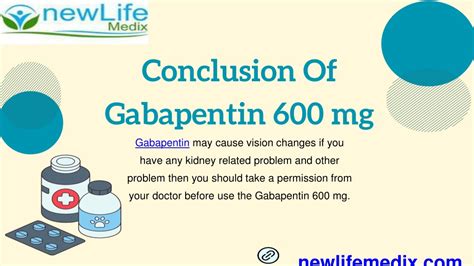Intro
Discover key facts about Gabapentin 600mg, including its uses, side effects, and interactions, to understand this medications role in managing seizures, nerve pain, and anxiety disorders, with insights into dosage and potential benefits.
Gabapentin, a medication primarily used to treat epilepsy and neuropathic pain, has become a widely prescribed drug for various conditions. The 600mg dosage is one of the common strengths prescribed to patients. Understanding the facts about Gabapentin 600mg is crucial for patients who are considering or are already taking this medication. Here are some key facts to know:
The importance of understanding the medication you are taking cannot be overstated. With the rise of prescription drug use, it's essential for patients to be informed about the benefits, risks, and proper use of their medications. Gabapentin 600mg is no exception, and being knowledgeable about this drug can help patients make the most out of their treatment plan. Whether you're a patient or a caregiver, having the right information can lead to better health outcomes and improved quality of life.
Gabapentin's mechanism of action, while not fully understood, is believed to involve the modulation of calcium channels in the nervous system, which in turn reduces the release of certain neurotransmitters that cause pain and seizures. This unique action makes Gabapentin an effective treatment for conditions like partial seizures and neuropathic pain. Furthermore, its relatively favorable side effect profile compared to other antiepileptic drugs has contributed to its widespread use. However, like any medication, Gabapentin 600mg comes with its own set of considerations and potential side effects that patients should be aware of.
As with any prescription medication, the decision to take Gabapentin 600mg should be made under the guidance of a healthcare provider. They can assess the patient's condition, medical history, and other factors to determine if Gabapentin is the right choice. This includes evaluating the potential benefits against the risks, considering alternative treatments, and discussing what patients can expect during their treatment. Open communication with healthcare providers is key to ensuring that patients receive the most appropriate care for their specific needs.
Introduction to Gabapentin 600mg

Gabapentin 600mg is a specific dosage of the medication Gabapentin, which is used to treat a variety of conditions, including epilepsy, neuropathic pain, and sometimes, mood disorders. The drug works by affecting the way that nerves send messages to your brain. When taken as directed, Gabapentin 600mg can be an effective part of a treatment plan for managing symptoms of these conditions.
How Gabapentin 600mg Works
Gabapentin's exact mechanism of action is not fully understood but is thought to involve voltage-gated calcium channels in the central nervous system. By modulating these channels, Gabapentin reduces the release of several neurotransmitters, including glutamate, norepinephrine, and substance P, which are involved in pain transmission and seizure generation. This action is believed to contribute to its therapeutic effects in treating epilepsy and neuropathic pain.Benefits of Gabapentin 600mg

The benefits of Gabapentin 600mg include its effectiveness in managing partial seizures and neuropathic pain. It is also sometimes prescribed off-label for other conditions, such as anxiety disorders, due to its anxiolytic effects. The medication has a relatively favorable side effect profile compared to other antiepileptic drugs, which makes it a preferable option for many patients.
Common Uses of Gabapentin 600mg
- **Epilepsy:** Gabapentin 600mg is used as an adjunctive therapy in the treatment of partial seizures and generalized seizures of tonic-clonic type. - **Neuropathic Pain:** It is effective in the treatment of neuropathic pain, which can be caused by diabetes, herpes zoster (shingles), or spinal cord injury. - **Anxiety Disorders:** Although not FDA-approved for this use, some clinicians prescribe Gabapentin off-label for the treatment of anxiety disorders due to its observed anxiolytic effects.Potential Side Effects of Gabapentin 600mg

While generally well-tolerated, Gabapentin 600mg can cause side effects. Common side effects include dizziness, drowsiness, fatigue, and nausea. Less common but more serious side effects can include mood changes, such as depression or anxiety, and in rare cases, suicidal thoughts or behaviors. It's essential for patients to report any side effects to their healthcare provider to adjust their treatment plan as needed.
Managing Side Effects
To manage side effects, patients can: - Take Gabapentin with food to reduce nausea. - Avoid driving or operating heavy machinery if dizziness or drowsiness occurs. - Stay hydrated to help reduce the risk of side effects. - Communicate openly with their healthcare provider about any changes in mood or if they experience any unusual side effects.Interactions with Other Medications

Gabapentin 600mg can interact with other medications, including:
- Antacids: These can reduce the absorption of Gabapentin.
- Morphine: Co-administration can increase the risk of respiratory depression.
- Other CNS Depressants: Combination with other central nervous system depressants can increase the risk of sedation and respiratory depression.
Avoiding Drug Interactions
Patients should: - Inform their healthcare provider about all medications, supplements, and vitamins they are taking. - Avoid taking antacids within two hours of taking Gabapentin. - Be cautious when combining Gabapentin with other CNS depressants.Dosage and Administration of Gabapentin 600mg

The dosage of Gabapentin 600mg can vary depending on the condition being treated and the patient's response to the medication. Generally, the dosage is started low and gradually increased until the desired effect is achieved. It's crucial to follow the dosage instructions provided by the healthcare provider and not to stop taking the medication without consulting them first.
Tips for Taking Gabapentin 600mg
- Take the medication at the same time each day to maintain a consistent level in the blood. - Do not crush or chew the tablets; swallow them whole with water. - If a dose is missed, take it as soon as remembered unless it is close to the time for the next dose.Conclusion and Future Directions

In conclusion, Gabapentin 600mg is a valuable medication for the treatment of epilepsy, neuropathic pain, and other conditions. Its effectiveness, combined with a relatively favorable side effect profile, makes it a preferred choice for many patients. However, like any medication, it's essential to be aware of the potential benefits and risks, follow the prescribed dosage, and communicate openly with healthcare providers.
Final Thoughts
As research continues to uncover more about Gabapentin's mechanisms and potential uses, it's likely that this medication will remain a crucial part of treatment plans for various conditions. Patients should stay informed, ask questions, and work closely with their healthcare providers to ensure they get the most out of their treatment with Gabapentin 600mg.What is Gabapentin 600mg used for?
+Gabapentin 600mg is primarily used to treat epilepsy and neuropathic pain. It can also be prescribed off-label for other conditions, such as anxiety disorders.
How does Gabapentin 600mg work?
+Gabapentin works by affecting the way that nerves send messages to your brain, specifically by modulating voltage-gated calcium channels and reducing the release of certain neurotransmitters.
What are the common side effects of Gabapentin 600mg?
+Common side effects include dizziness, drowsiness, fatigue, and nausea. Less common but more serious side effects can include mood changes and, in rare cases, suicidal thoughts or behaviors.
We hope this comprehensive guide to Gabapentin 600mg has been informative and helpful. If you have any further questions or would like to share your experiences with Gabapentin, please don't hesitate to comment below. Sharing knowledge and personal stories can help others make informed decisions about their health and treatment options. Remember, it's always best to consult with a healthcare professional for personalized advice and care.
